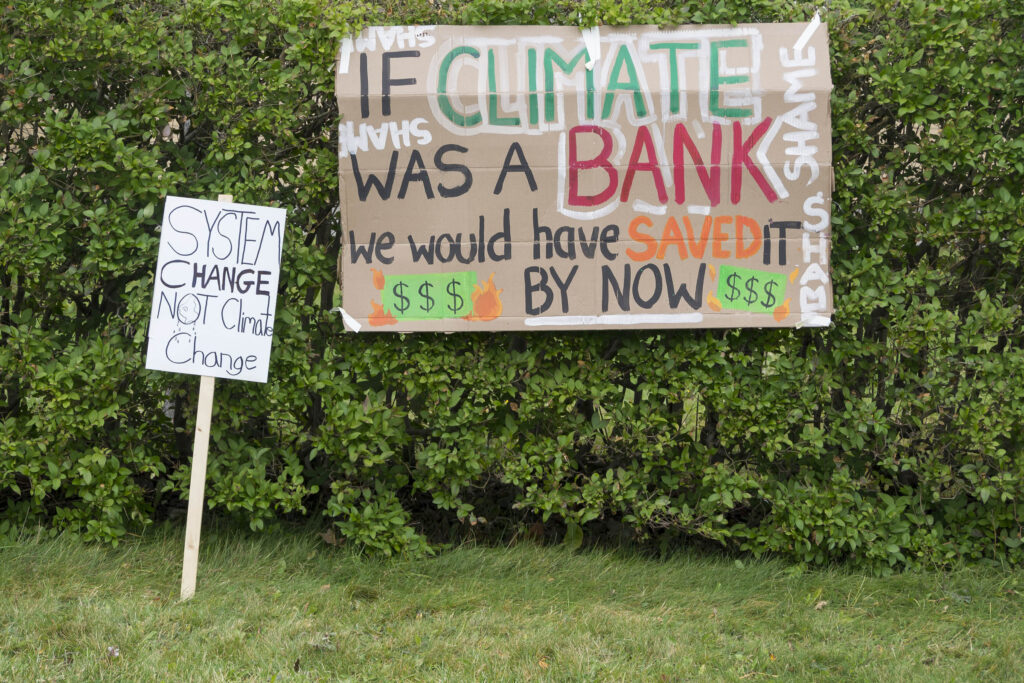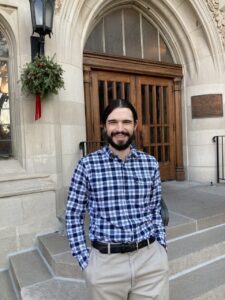COP27: A Garrett Student’s Sustainable Vision of Hope
December 5, 2022

For 27 years, the United Nations has held a Conference of Parties (COP) to assemble and address issues of climate change. Delegations from every nation in the world, as well as non-governmental organizations, convene for two weeks to negotiate, present, discuss, and debate how the global community can confront climate change. This year’s summit, COP27 was held in Sharm al-Sheikh, Egypt, and I had the privilege of attending as a delegate representing the Episcopal church.
As I write, COP27 has wound down. The 45,000 participants from around the world have transitioned back to their day-to-day lives: flying home, readjusting sleep schedules, returning to the rhythms of our respective lives.
It was an exhausting process, often demoralizing, but ultimately—perhaps—successful. For the first time, developed nations (such as European Union member states and the United States) committed to establishing a fund that developing nations can draw upon when they incur loss or damage due to climate change. While the United States and its European allies have had the greatest impact on global climate change, they have so far suffered far less than their neighbors and, there has been increasing frustration from the global community at their unwillingness to provide financial restitution. With the establishment of this fund, there finally seems to be a framework for just reparations.
While the specifics have yet to be ironed out, with no funds to be disbursed until at least COP28 next year, I feel cautiously hopeful. I’m deeply glad for having had the chance to participate in the process, in however marginal a way, and I feel like I learned a tremendous amount simply by being present and listening.
Over the past two weeks, I’ve been repeatedly asked “Is there hope?” and “What can I do? What can any of us do?” To the former, let me assure you: there is hope. Humanity will survive this, as will the planet. We are unlikely to stay below the target goals for limiting the worst effects of climate change, it’s true, and that will lead to great human tragedy. I don’t want to ignore or diminish that reality.
Also, people have succeeded in coming together to address the problems before us; nations are coming together with each other to minimize harm in the years to come. We cannot stop acting, but through action, we absolutely have hope for a bright future. As to what we can do? As individuals, some of our most outsized impact can be made with very small tweaks to our lifestyles, focusing first and foremost on low-hanging fruit. Simply eating less meat per week, wasting less food that we buy, and buying fewer consumer goods has a pronounced impact on our carbon footprints.
Clergy and church communities can raise our voices so that those with more influence can know what we value—for example we can writing to the Bishop’s office with your concerns and priorities. Likewise contact your elected representatives, who can help lift up the urgency of climate change and the extent to which their constituencies desire action.
Yes, the road ahead is long, but God’s grace is good. Let us continue to pray as though everything depends on God while living as though everything depends on us. Amen.
Visit the Center for Ecological Regeneration or attend one of their workshops to learn more about Garrett-Evangelical Theological Seminary’s commitment to climate stewardship and restoration.

Seán Hansen is second-year masters of divinity candidate at Garrett-Evangelical Theological Seminary, and an aspirant for the priesthood with the Episcopal Church. He lives in Rogers Park with his partner, Ellie, and their two cats, Gus and Astrud.
Garrett-Evangelical Theological Seminary forms courageous leaders in the way of Jesus to cultivate communities of justice, compassion, and hope for the thriving of the church and the healing of the world. Garrett realizes this mission through educational programming and strategic partnerships that address the most critical religious and social issues that the church and the human family must confront with courage, innovation, and collaboration.

